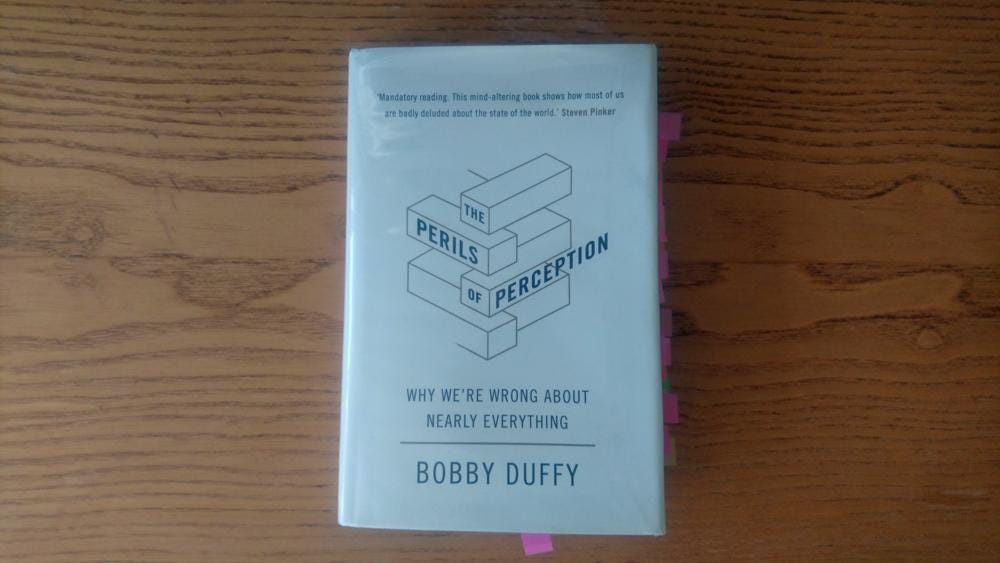FIRST LINE
I hated my psychology classes at school.

FROM THE BLURB
Informed by exclusive research across 40 countries, conducted by global polling firm Ipsos, The Perils of Perception investigates why we don’t know basic facts about the world around us.
EXCERPTS
1. ‘The more who die, the less we care.’
In a series of experiments testing how much people would donate to (fictional) hungry children in Africa:
[Paul] Slovic found that our willingness to help decreases when the number of victims moves from one to two. As he puts it: ‘The more who die, the less we care.’
2. Accept the emotion, but challenge the thought
Denying that we have an emotional reaction to, for example, immigration (whether positive or negative) is pointless and impossible, but accepting these emotions and trying to understand them is not. ... This is a parallel of Kahneman urging us to give up on changing our System 1 reactions, but rather training ourselves to get System 2 to kick in when we need it.
3. Lack of trust in the government isn’t new
Even in the summer of 1944, as the D-Day landings were hitting the beach, only 36 per cent of the British people thought the government could be trusted to put the country's interest above their own individual or party's interest.
4. Predictable improvements aren’t newsworthy
As Max Roser from the University of Oxford points out, newspapers could have legitimately run the headline, ‘Number of people in extreme poverty fell by 137,000 since yesterday’ every day for the last twenty-five years. But, as we've seen from academics’ detailed analysis of news values and criteria, the predictable isn’t newsworthy, because that’s how our brains work: we get the media we deserve and, to some extent, crave.
5. The more wrong we are about the world, the more confident we are in our answers - and the more likely we are to desire a ‘strong leader’
Duffy reports on the Ipsos Misperceptions Index, which ranks countries by how wrong they are about the world.
There is a strong relationship between confidence and being wrong, with poorer performing countries more confident than their more accurate counterparts.
[T]here is no apparent link between our index scores and how highly people rate their government, how positive they are about the direction the country is going in or how much trust they have in national institutions. However, there is one finding that does correlate strongly with our Misperceptions Index at a national level, which is agreement with the statement that, ‘I wish my country was run by a strong leader instead of the current government.’
NEW CONCEPTS
Psychophysics
[W]e tend to overestimate small values and underestimate large values, again in a predictable way. ... [I]t is (very) basically a reflection of our sensible approach to uncertainty, where we rescale our answers, hedging our bets towards the middle of the available options
Perceptual Screen
[F]acts struggle to cut through our partisan beliefs or our ‘perceptual screen’ as Angus Campbell and colleagues outlined in their classic book, The American Voter, back in 1960.
Pluralistic Ignorance
Social norms can linger long after their sell-by date, partly because we think some beliefs and behaviours are much more common than they really are. We should have more courage in our convictions, and guard against stereotyping our fellow citizens.
LAST LINE
We can learn a lot by understanding why we’re often wrong.
END MATTER
The Perils of Perception was recommended to me by M.G. Thanks!
249 pages, ~75,000 words
Read: 16 February 2020 to 20 February 2020 (5 days)


